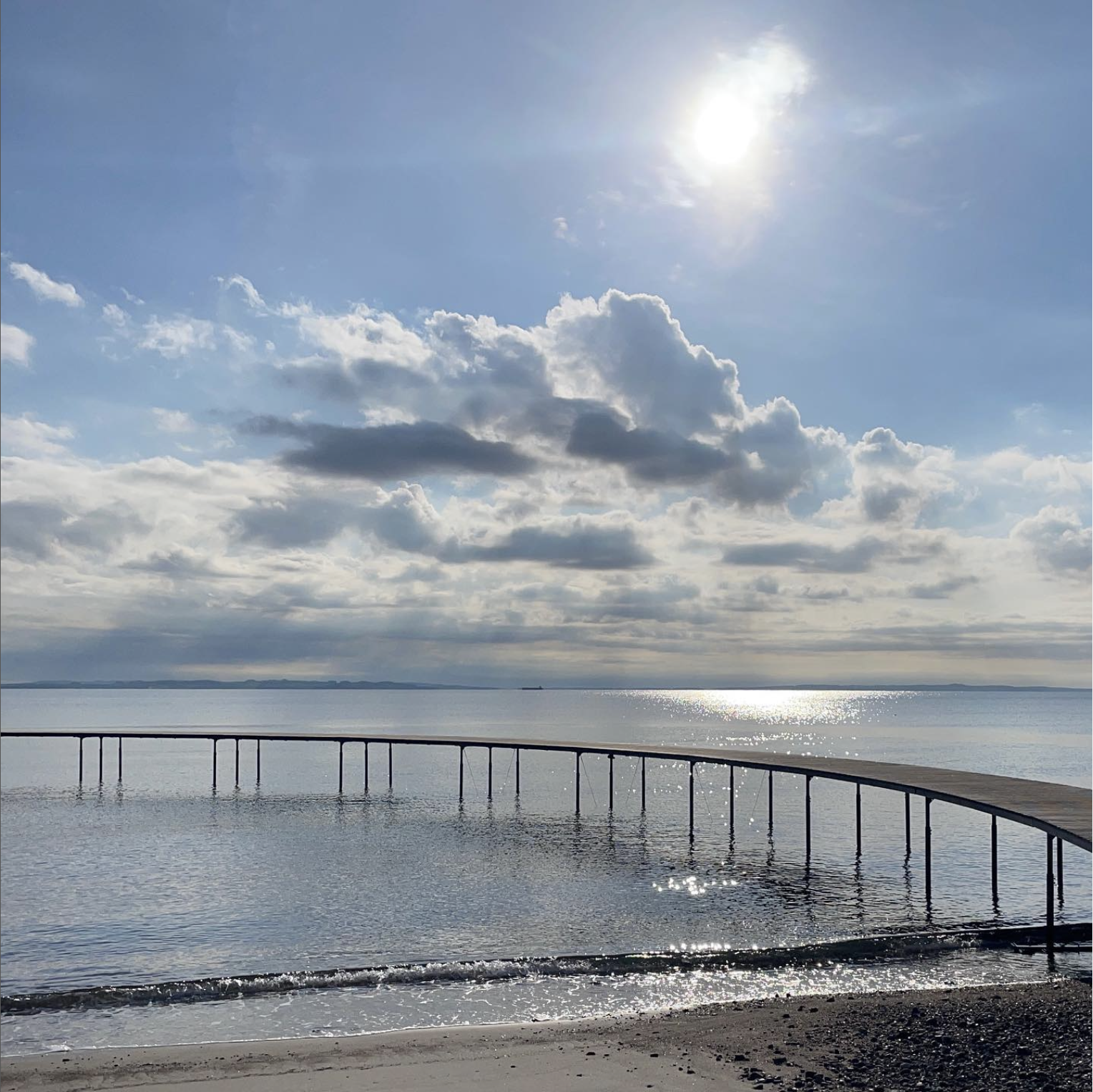
My notes from last week’s ICED22 conference
Starting out with a wave watching picture from my walk before the first day of the conference. When in Aarhus, I had to get in the 90 minute walk before the first presentation and visit the infinite bridge!
Last week, I attended my first ICED, The International Consortium for Educational Development’s, conference. And since I took an insane amount of notes which are almost unreadable now and will become completely unreadable as I forget the context, I thought I’d go through them & write them up nicely (mostly for my own benefit, but if you are curious to read about my experience, you are welcome to do so! :-)).
First keynote: Kathryn Sutherland on Holistic Academic Development
The keynote was opened up by giving a definition of academic development: “creation of conditions supportive of teaching and learning ” (Leibowitz, 2014), which was new to me, but which I relate to very much. The main message I got from this keynote was that we as academic developers should think about people — and in this context especially about academic teachers — as whole people who have lives beyond their teaching (and also more academic duties than “just” teaching, namely often also research, admin, and science communication), and might need development and support in all areas. She talked about many things, but especially one idea I thought was brilliant: A four day “carers’ retreat” for people with caring responsibilities, who for the duration of those four days were taken care of, so that the carers could focus on writing and connecting and forming community. Forming community was also the theme in another example, where new teachers worked with two students from a different field to develop their teaching — and a sense of belonging, both for the teacher and the students.
All the examples that were shown in this keynote were rooted in values and communicated with them: The carers’ retreat, for example, was based on love and care. One other value was, for example, autonomy, which was expressed in helping people gain the courage to actually develop agency and act autonomously.
One reference that was mentioned in this keynote was Iqbal & Vigna (2021), there in the context of care in collaborations, but when I read it I especially loved the quote that “if the instructor took risks, then they [the students], too, felt supported to take risks in their academic work”. What started out as a caring and trusting relationship between a teacher and an academic developer “progressed outwards”, to include more teachers, and also the students.
Symposium on Well-Being
The most memorable part of this symposium was the presentation by Margaret Bearman (given via zoom!) on belonging in hybrid and virtual settings, and my main take-away is that belonging is not something that you feel (or don’t), but that it is something that you do: it’s strategic, purposeful, agentic. Belonging, they find, can have three modes: With peers (obviously!), with courses (materials, discipline, teacher), and not in isolation. And I find this is super helpful to think about: If, for some reason, I can’t influence how much a student feels connected to their peers (for example if there is absolutely no way to integrate any kind of, not even asynchronous, group interactions in a course [maybe because a course is hosted virtually and students can start it at any time, so that there are no co-horts, and for privacy reasons there can’t even be online discussion forums]), then I can still put an effort in that students feel connected to the materials or the discipline. Which is definitely better than nothing.
One quote that really stood out to me in Rikke Toft Nørgård‘s presentation on playfulness (that was the next one in the same session, and that was super interesting, but I did not take enough notes to be able to reproduce the completely new-to-me ideas here) was that “the opposite of play is not work, it’s depression”.
Symposium on “Sustainable academic development after a global pandemic”
In this symposium, two studies on a similar topic were presented. The first one, by Katarina Mårtensson and Cathy Bovill, investigated how teachers perceived the onset of the pandemic, and what kind of lessons we can learn from that. What happened was basically that the essential role of student-staff and student-student interactions became clear (because it changed so drastically from one day to the next); that teachers developed (or showed?) a lot more care for students, and that teaching became a problem-solving exercise.
The lessons we, as academic developers, can learn from this is that it is really important to create spaces where teachers dare to try out new practices. During the pandemic we did not have any choice but go online, but how could we create similar (ok, maybe slightly less) urgency for other new practices? Another lesson is that the importance of sharing needs to be acknowledged. Many teachers talked more to their colleagues during the onset of the pandemic than ever before, just because suddenly there was a need to learn from others’ experiences and not try to cope on our own. But just because this became more obvious during the pandemic, more sharing would probably also be a good idea when we are back “to normal”. And lastly, how can we make sure that we, as academic developers and as teachers, don’t just revert back “to normal”, but make sure we build on the experiences and lessons learned?
The second presentation by Yael Harlap and Robert Gray also invested how the pandemic disrupted “normal” ways of being in community and relationships in teaching and learning, and how many assumptions about the role of an educator changed.
Workshop on teaching strategies to reduce anxiety levels in students
I really really enjoyed this workshop, but unfortunately I did not write down the names of the three ladies that ran it and I have not been able to find their names retrospectively. But you know who you are, and if you read this please reach out so I can add your names: Credit where credit is due!
What I found so great about this workshop is that they gave us a model for what stress (about what’s going on now) and anxiety (worries about the future) are caused by: NUTS
Novelty
Unpredictability
Threat to ego
Sense of low control
And they gave us a sketch of a person and let us draw in where we feel stress. Me: In my stomach, definitely in my head, and in my shoulders that become super tense and cause tension headaches!
We worked through a case study of how we recognize student stress and what we can do about it, and they gave us teaching strategies that we can use. It was just great to learn something that is directly applicable!
Workshop on artefacts
Then, on day 2 of the conference, I attended a workshop on artefacts by Katarina Mårtensson, Karin Brown and Pia Scherrer. This workshop was super cool, because they were walking the talk and had us create artefacts in a structured way to document & share our ideas. Here, my notebook contains just the note “-> artefact” to point future me to my notes on the form they provided. In that form, we first noted down individually what kind of artefacts we are using at our institution, and then shared at our table and with the large group. Artefacts I had never even considered as such include name badges, postcards, signage at a conference! Speaking of postcards: A really great idea that someone on the ICED organizing committee had were “walk & talk postcards”, that gave suggested roundtrips for 5, 10, 20 or 30 minute walks at the conference location (see image below)! Super brilliant idea, I think!
After sharing what kind of artefacts we use, we noted down an action we want to take when we get home (I’m on mine already!), and then talked about how artefacts are made visible to others, and again, what we want to do when we get home. Then, there was even a phase for us to conclude: To identify the biggest lever and what the first step would be to bring it into action, plus a 30 second “pitch” to sell it to the relevant stakeholder. I won’t share my pitch here, but I can tell you that I really want to work on my team’s online presence!
Shoutout here also to my great “table mates” that I was super excited to connect with: Jenny Scoles, who does really amazing work with the “teaching matters” blog, and Sara Petchey, who has developed a super useful bias awareness flyer.
Keynote Katarina Mårtensson and Torgny Roxå on significant relationships
I have to confess that I don’t have good notes on this presentation! I took the picture below because I needed a wave watching picture for my Instagram on a day I hadn’t otherwise seen any water, and I remember that it shows a beach close to Perth where Katarina and Torgny had a significant conversation at some ICED conference. But the details? From what I recall, they walked us through how teachers typically have something like 3-5 people that they discuss their teaching with, and that those are not necessarily in the same institution, and don’t necessarily talk between them, either. Those are significant relationships, and in order to change teaching culture, we have to influence the conversations people are having, inside our workshops and more importantly among themselves. Depending on whether people trust each other and whether they share responsibilities, different types of microcultures develop, and ideally we want high trust and shared responsibility, a “we are in this together!” commons, and, if they have a shared development agenda, a Community of Practice. And that’s our goal in all we do.
Presentation Katja Eftring & Torgny Roxå on the student and teacher conversations on student evaluations of courses here at LTH
I’ve written about the course evaluation system at LTH before, and the most important feature is that the questionnaire CEQ is asking students about their experiences of specific features of the course that we know are conductive to learning. And then the answers are compiled into a report and discussed between students and teachers.
Katja was employed as a student at my group (before my time, though!) and investigated how students prepare for and experience those conversations with the teacher. My main take-aways is that this is handled very different in different study programs: while there is always a training of new people by more experienced people, sometimes the students having the conversation with the teacher are actually taking that specific course this year, in other study programs a small group of students has all conversations in a given year. Sometimes the conversation is picked up repeatedly after the meeting, mostly it is not. This was a really interesting presentation!
Later in that session, there was a presentation by Emma Taylor, also a (former) student employee, and Cathy Bovill, where they presented an investigation into how students interpret the word “curriculum”: As something that is offered to them in terms of structure, or as something they have to obey, or completely not understanding the word.
Workshop on peer-coaching
Then I attended another great workshop, by Dagmar Engfer & team, where we were introduced to the concept of peer-coaching and went through one round to experience a specific method. In a nutshell, in peer-coaching, peers meet and coach one of them on a problem that person brought with them. In our case, this happened in a highly structured way (which is awesome, because it means that a case can be satisfyingly worked on within 30 minutes!):
First, the case owner presented it, then the moderator and the rest of the group got the chance to ask questions for clarification. Then, the case owner turned around so we wouldn’t be influenced by their facial expressions, and we talked through our suggestions. Lastly, the case owner gave us feedback on what they wanted to take on.
And that was fun! We also had a super interesting case on how to combine cooperation and competition (and that’s all I will say on that to protect confidentiality). What I’m definitely taking with me is that peer-coaching is a fun & effective method that I might start integrating into my own work.
Presentation on teacher confirmation by Mayuko Nakamura
This was a super interesting presentation that I happened to be in by accident, because my friend Jenny was speaking next and I wanted to help her out with the online audience in her hybrid presentation. But I’m so glad I ended up here!
“Teacher confirmation” was new to me as a concept (but obviously not as a phenomenon): A teacher communicating students that they are recognized, endorsed, acknowledged as valuable, all the good stuff. It contributes significantly to students’ cognitive and affective learning, and can be measured on a scale by Ellis (2000) with items like how well a teacher listens, whether they focus on a few or all students, whether students feel respected, communicates interest in student learning, … Mayuko had used this instrument to investigate what was important to students in March 2021 (prompt responses to emails & teachers showing that they understand students’ struggles), but I am now mainly interested in using that instrument on people I have taught to get their feedback on how confirming I am. That will be so interesting!
Presentation by Jennifer Löfgreen & Torgny Roxå on something something SoTL
In her presentation on “SoTL: an epistemological and methodological trap?”, Jenny presented how we all come from different disciplines into SoTL, leading to many different SoTL “flavours” that are in tension not just among each other, but also with the source fields on the one hand, and educational research on the other. She argued that we should free ourselves from the traditions we grew up in and instead ask whatever question and use whatever technique that is most relevant in any given situation. And while I see that this might make a lot of people not super happy, to me it’s just super well-argued common sense.
Aslo I would like to point out that Jenny, to my knowledge, was the only person who sent the virtual participants into breakout rooms, which, as we saw in the chat later, they really appreciated very much. Hybrid conferences are not easy, especially if nobody makes an effort to include virtual participants…
Keynote on the “returning home problem” by Klara Bolander Laksov
Even though I am showing just one picture below, this keynote definitely won the wave watching competition that none of the keynote speakers know they were involved in…
What Klara spoke about is that while teachers might come enthusiastically out of our workshops, this does not mean that their enthusiasm will translate into action later on. So she suggested several things we can do (all tried and evaluated, of course), for example getting a great coffee machine and hijacking people there for conversations about teaching and learning.
Since I had recently heard Klara present similar content, I unfortunately didn’t take good notes, but I am hoping that ICED will post her (and all others’) slides soon!
Keynote by ICED president Kasturi Behari-Leak
By this point in the conference, I was super tired, and my notes only consist of the verbatim quote “gravitas to demand that kind of funding” (speaking of minorities that are not as bold as … others), which I thought was a great way of putting it.
This was an inspiring speech full of goosebump moments. And even without having it written down, the take-home message was clear: We are the ones to make change happen. We are the ones we were hoping for!
Other significant conversations
In addition to all these formal presentations, I really enjoyed connecting with other colleagues: For example Marianne Merkt, who was leading the “Master of Higher Education” program in Hamburg when I took it more than 10 years ago and who I hadn’t seen or been in contact with since, or Robert Kordts, who is a colleague in Bergen and on the advisory board of Kjersti’s & my project, or another colleague from Bergen, Anja Møgelvang, who does super interesting work on facilitating cooperative student learning. And, also from Bergen (I’m noticing a pattern here!) Robert Gray and Yael Harlap, who I hadn’t met in person before (but Yael’s work with a group of teachers on sustainability has been something I’ve been planning to find out more about for a while now). And then, of course, meeting legends like “relationship-rich education” Peter Felten, or “In the eye of the storm” Michele DiPietro in person. And so many more!
General reflections
Having said that, now that I have attended my first ICED, I am very aware that I did that from an extremely priviliged position: I knew three of the five keynote speakers in person, so when someone referred to “Torgny” or “Katarina” (as people often did!), I knew they meant “Torgny Roxå” or “Katarina Mårtensson”. So a lot of the secret code that was used at the conference was actually understandable to me, but just because I am lucky to work in the right place. This is not the case for most other newcomers, who might not feel especially welcome or cared for, which is a pity (although I think that not having names associated with presentation titles in the app and program was a good move to make it a bit more difficult to be too clique-y. I, for one, decided by title which sessions I would attend with only one exception).
So how was ICED22? I feel like I missed out on so many exciting sessions that were in parallel to the exciting sessions I did attend! On the other hand, it was as exhausting as it was inspiring, and I don’t think I could have taken much more. My very wise and super awesome role model (not mentioning any names here so it doesn’t fall back on her if I misrepresented something or someone in this post) said that her ambition when going to a conference is to come away with three good things: contacts, ideas, new articles to read. Looking through all my notes above, I think I did pretty well!
And with this I will leave you with some wave watching from my journey home. Were you at ICED? What was your favourite take-away? Do you have anything to add to my account? I’d be happy to host guest posts on your presentations or take-aways!
References
Ellis, K. (2000). Perceived teacher confirmation. The development and validation of an instrument and two studies of the relationship to cognitive and affective learning. Human Communication Research, 26(2), 264-291.
Iqbal, I. & Vigna, J. (2021) Care in collaborations: opening up conversations about teaching, International Journal for Academic Development, 26:3, 383-387, DOI: 10.1080/1360144X.2021.1937183
Leibowitz, B. (2014). Reflections on academic development: What is in a name?. International Journal for Academic Development, 19(4), 357-360.
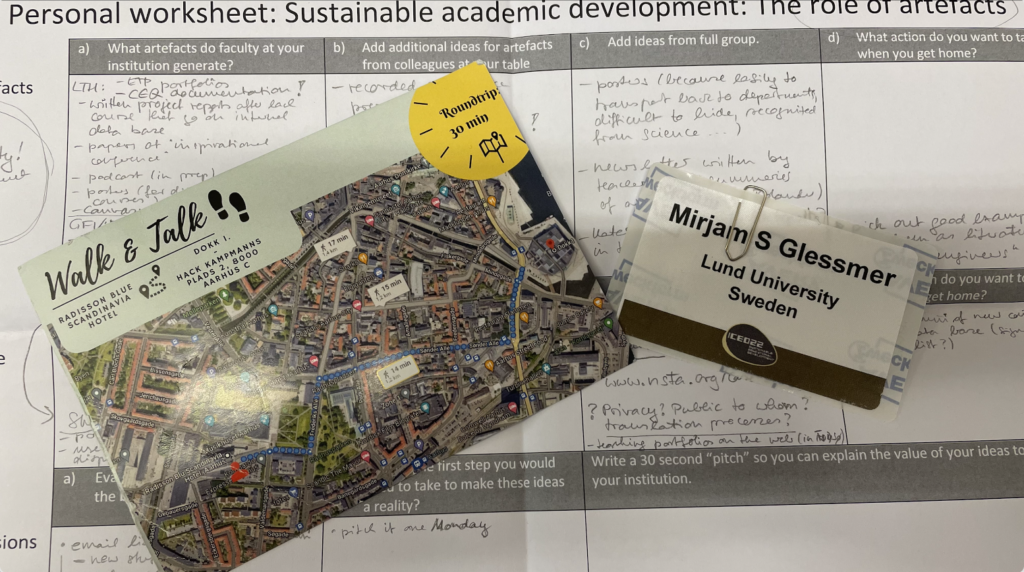
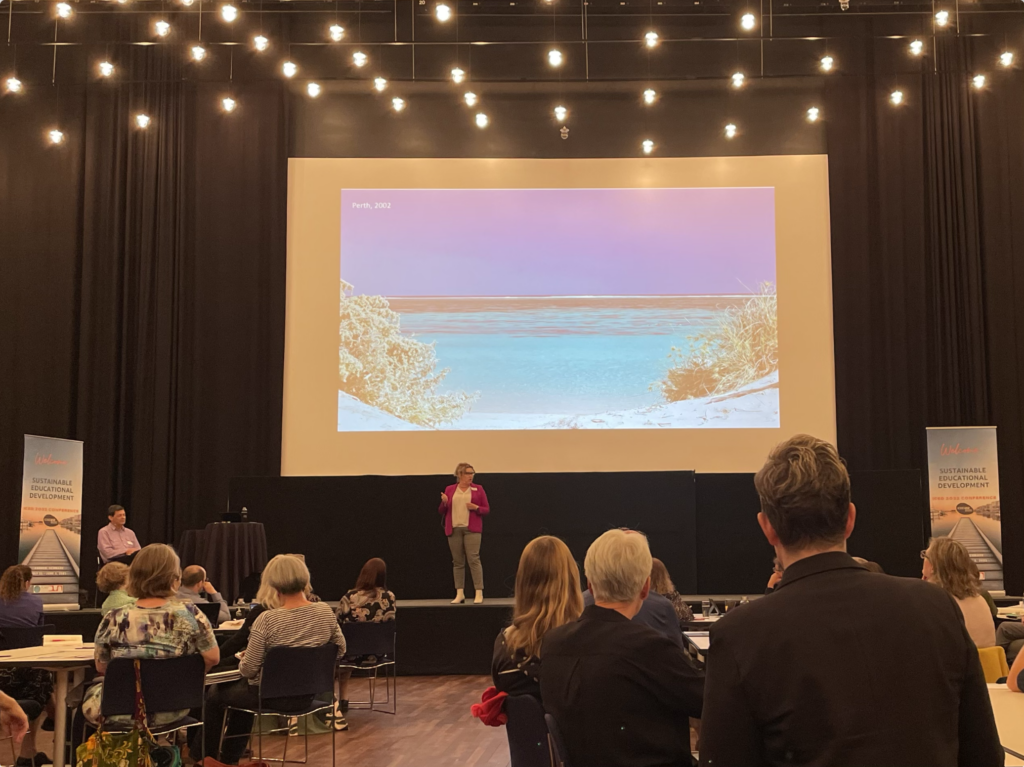
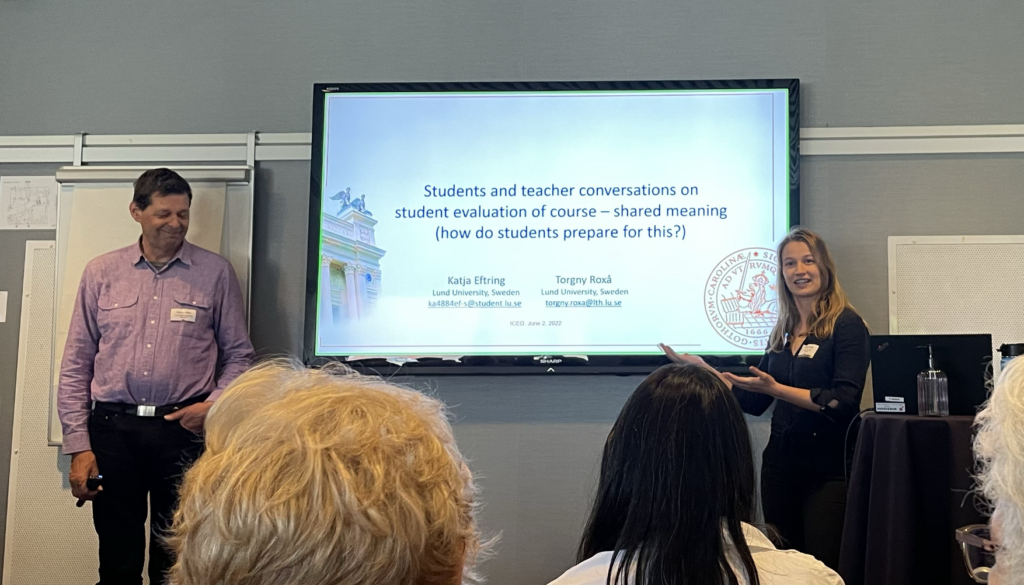
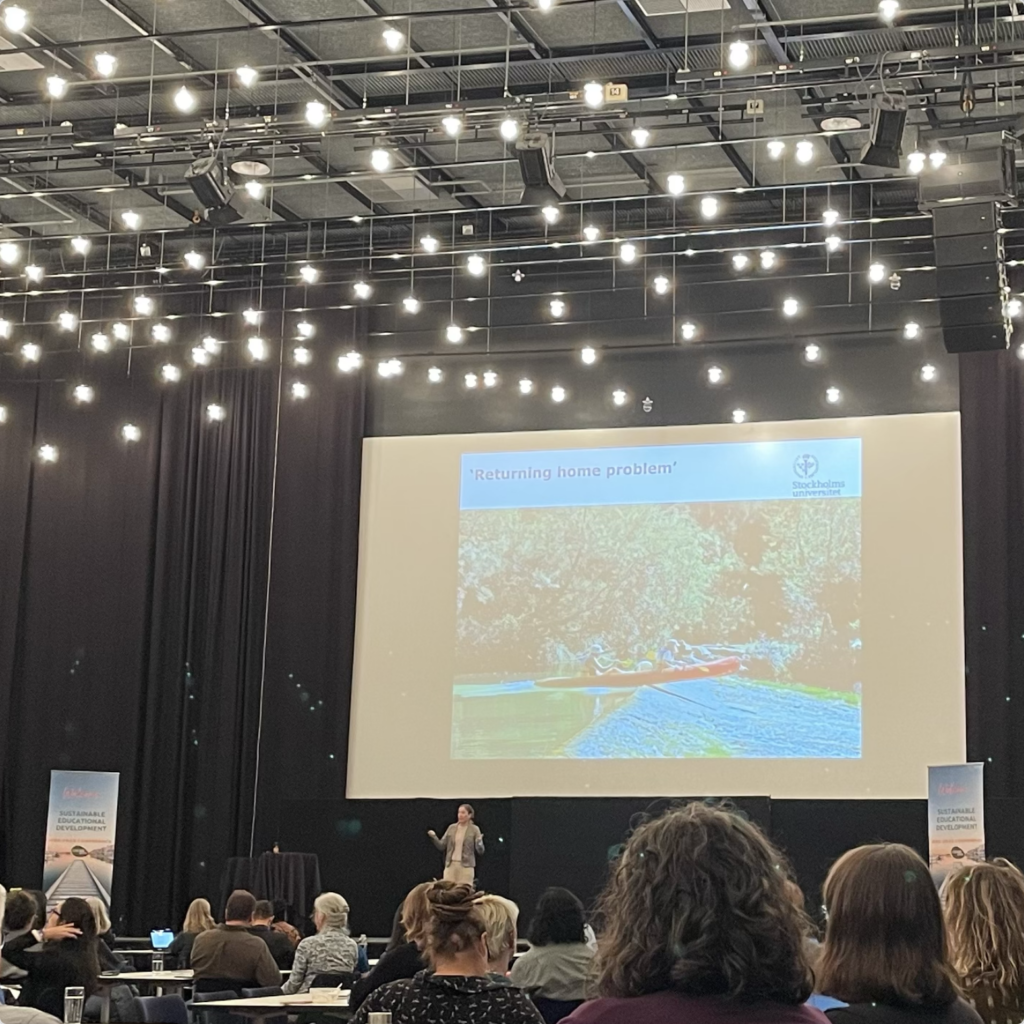
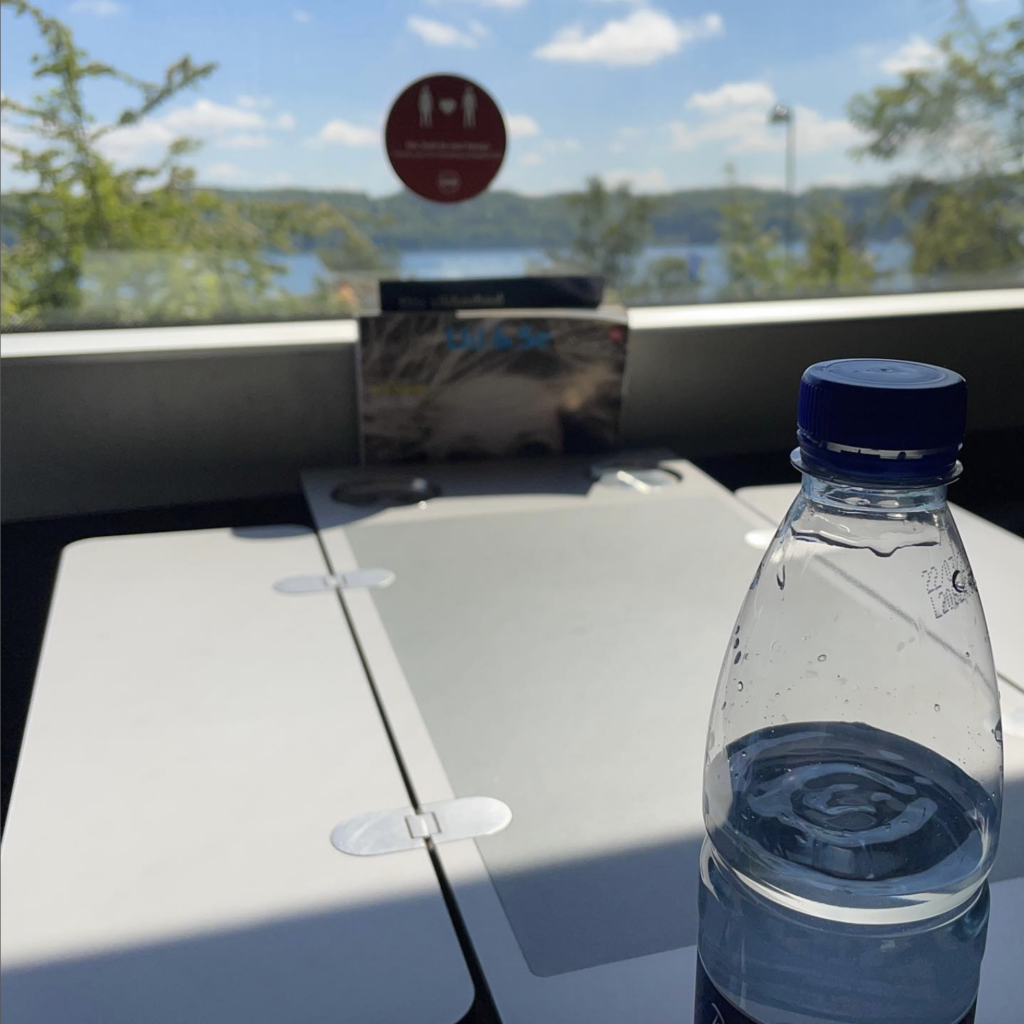
Academic development as "collaborative knotworking" (currently reading Elmberger et al., 2020) - Adventures in Oceanography and Teaching says:
[…] academic development. I think it is really helpful to think about this in the context of the “returning home problem” (or more recently, the “returner problem”): Despite sometimes enthusiastic […]